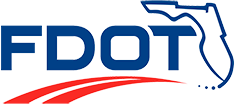Florida Transportation Plan (FTP)
Economic Competitiveness / Quality Places / Environment & Energy

Objectives
Meet or exceed industry, state, national, or international standards for infrastructure quality, condition, and performance for all modes of transportation
Optimize the functionality and efficiency of existing infrastructure and right-of-way
Adapt transportation infrastructure and technologies to meet changing customer needs
Increase the resiliency of infrastructure to risks, including extreme weather and other environmental conditions
Implementation Actions
Continue to enhance asset management practices at the state and local levels
Key Partners Include:
- Florida DOT
- Metropolitan Planning Organization Advisory Council
- Florida Association of Counties
- Florida League of Cities
- Florida Transportation Builders Association
- TEAM Florida
- Florida Public Transportation Association
- Florida Airports Council
- Florida Ports Council
- Florida Railroad Association
- Space Florida
Continue implement FDOT's Transportation Asset Management Plan (TAMP) and expand this plan to encompass additional modes. Coordinate TAMP with updated performance measures consistent with MAP-21 and the FTP. Research global best practices and appropriate standards. Provide tools to assist local governments in documenting the condition of road, transit, and other infrastructure and implementing strategies to improve infrastructure quality, condition, and performance.
This Implementation Action supports the following FTP objectives:
- Meet or exceed industry, state, national, or international standards for infrastructure quality, condition, and performance for all modes of transportation
Develop policies and standards for next generation transportation corridors
Key Partners Include:
- Florida DOT
- Florida Transportation Builders Association
- Florida Engineering Society
- Modal partners
- Utility partners
Policies should incorporate and support emerging technologies such as connected vehicles or alternative fuel sources; incorporate innovative design features to improve safety and efficiency; enable separation of freight and passenger vehicles or of through and local trips; support integration of compatible uses such as utility infrastructure; and provide flexible/reversible or multi-level infrastructure. Develop a pilot 21st century corridor that incorporates multiple innovations to test them. Build on work already underway through the Transportation System Management and Operations program and the Future Corridor Planning Process. Identify and build on national and global best practices.
This Implementation Action supports the following FTP objectives:
- Meet or exceed industry, state, national, or international standards for infrastructure quality, condition, and performance for all modes of transportation
- Optimize the functionality and efficiency of existing infrastructure and right-of-way
- Adapt transportation infrastructure and technologies to meet changing customer needs
- Increase the resiliency of infrastructure to risks, including extreme weather and other environmental conditions
- Provide transportation infrastructure and services to help prepare for, respond to, and recover from emergencies
- Prevent transportation related fatalities and serious injuries
Strengthen research, development, and deployment of new technologies and practices
Key Partners Include:
- Florida DOT (lead)
- State Transportation Innovation Council
- Florida Transportation Builders Association
- Florida Research Consortium
- Florida Institute of Consulting Engineers/Florida Engineering Society
- ITS Florida
- Modal providers
- Space Florida
Establish vision of exceeding in innovation. Strengthen research and development investments and partnerships. Continue building on existing automated and connected vehicle research, testing, and pilots. Train staff to work with new technologies and incorporate these technologies in long-range plans and models. Identify and apply national and global best practices. Identify changes needed to laws, regulations, standards, and planning processes.
This Implementation Action supports the following FTP objectives:
- Meet or exceed industry, state, national, or international standards for infrastructure quality, condition, and performance for all modes of transportation
- Optimize the functionality and efficiency of existing infrastructure and right-of-way
- Adapt transportation infrastructure and technologies to meet changing customer needs
- Increase the resiliency of infrastructure to risks, including extreme weather and other environmental conditions
- Provide transportation infrastructure and services to help prepare for, respond to, and recover from emergencies
- Prevent transportation related fatalities and serious injuries
Key Partners Include:
- Florida DOT (lead)
- Florida Division of Emergency Management
- Florida Department of Economic Opportunity
- Metropolitan Planning Organization Advisory Council
- Florida Association of Counties
- Florida League of Cities
- Florida Transportation Builders Association
- Modal providers
Conduct additional research or pilots. Develop tools for integrating transportation data with hazard mitigation data. Provide training to MPOs and local governments.
This Implementation Action supports the following FTP objectives:
- Provide transportation infrastructure and services to help prepare for, respond to, and recover from emergencies
- Provide transportation infrastructure and services to help prepare for, respond to, and recover from emergencies

